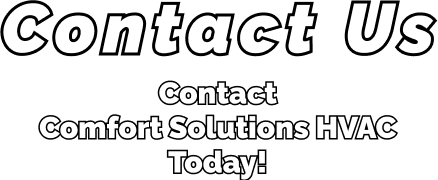Expert Advice from Your Trusted HVAC Technicians
Most of us are already familiar with the dangers of carbon monoxide. The odorless and colorless gas poses an extreme risk to your health if you unknowingly breathe it in. For this reason, it is important to have carbon monoxide detectors installed throughout your home and place of business. However, while these devices can alert you to a leak and prevent serious bodily harm or even death, they are unable to provide guaranteed protection from the various outcomes of high carbon monoxide exposure. Even if you are not injured thanks to early detection, you may still encounter some costly consequences.
To avoid these outcomes, carbon monoxide leaks must be prevented from happening in the first place. To do so, keep in mind the following HVAC safety tips from the experts at Comfort Solutions HVAC.
4 Effective HVAC Safety Tips to Keep You and Your Loved Ones Safe from Carbon Monoxide
Here are some common HVAC safety tips you need to remain safe in your home.
- Understand How Your Systems Work: Certain HVAC systems produce carbon monoxide and others that cause carbon monoxide leaks. For instance, air conditioning units cannot cause carbon monoxide poisoning because they don’t burn fuel to operate. Instead, it is your heating system or fuel-burning appliances that you need to pay attention to.
- Implement an Evacuation Plan: If your carbon monoxide detector goes off, it’s important to have an evacuation plan in place. For instance, make sure that everyone in your home can quickly leave the premises and has a basic understanding of how to shut down all HVAC equipment. Once potential sources of a carbon monoxide leak are cut off, immediately open as many doors and windows as possible to improve your ventilation.
- Periodically Clean Your Vents and Flues: Blocked vents and chimney flues are one of the leading causes of carbon monoxide leaks. Harmful gases can get trapped inside the building due to an accumulation of dust and other debris. Regular cleaning of these ventilation systems can eliminate any blockages and help prevent dangerous gas leaks.
- Monitor Your Indoor Air Quality: When it comes to a malfunctioning HVAC system, one of the best early detection strategies is monitoring the quality of your indoor air. By keeping your indoor air as clean as possible, you can avoid the release of harmful gases inside your home and be more likely to notice anything unusual as soon as it occurs.
- Schedule Regular HVAC Maintenance: Before the start of winter, have your furnace and other fuel-burning appliances inspected by a qualified HVAC professional. Regular maintenance can help you identify any potential red flags which can prevent carbon monoxide from becoming a problem. Ideally, it is important to develop a relationship with one HVAC company that can offer you a preventative maintenance contract. That way, you can get service from technicians who are familiar with both your space and equipment.
If you are spending the majority of your time inside your home due to COVID-19, it’s more important than ever that you understand the effects of carbon monoxide and follow our HVAC safety tips. At Comfort Solutions HVAC, ensuring your safety and comfort are our top priorities. We can keep a close and professional eye on your HVAC system to help prevent toxic leaks from contaminating your living space and endangering the health of your loved ones. When you schedule your HVAC maintenance services with us, our certified technicians will perform a thorough inspection of your system, in addition to cleaning and testing its components to identify any safety risks, as well as offer you insightful user recommendations.
Enhance your safety and comfort with furnace maintenance services from the experts at Comfort Solutions HVAC. Call us at (610) 486-3882 or contact us online to schedule an appointment.






